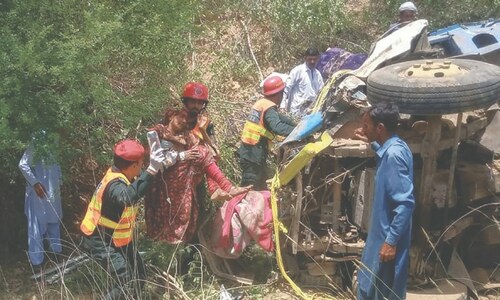WASHINGTON, Jan 20: Pakistan, along with Afghanistan and Iraq, is among the three top countries the United States sees as the hub of activities that threaten America’s global interests.
In an annual report to the US Congress, the Department of Homeland Security mentions Pakistan as a country where `many of our most important interests intersect’ and `where the Taliban and Al Qaeda maintain critical sanctuaries’.
The report, posted on the State Department’s Web site on Friday, also mentions the possibility of a nuclear conflict between India and Pakistan, noting that `the prospect of renewed tensions with nuclear-armed India remains despite improved relations’ between the two countries.
Pakistan also gets a special mention in a separate assessment of proliferation threats: “We are mindful that Pakistan was a major source of nuclear proliferation until our efforts disrupted A.Q. Khan's network.”
The report that Homeland Security chief John Negroponte presented to the Senate Select Committee on Intelligence, describes Pakistan as `a frontline partner in the war on terror’, which `remains a major source of Islamic extremism and the home for some top terrorist leaders’.
The department acknowledges that eliminating the so-called `Taliban safe havens’ in Pakistan's tribal areas is `not sufficient’ to end the insurgency in Afghanistan, `but it is necessary’.
While pressing Pakistan to expedite its efforts against terrorism, the report recognises that `aggressive military action … has been costly for Pakistani security forces’ and assures Islamabad that Washington `appreciates concerns over the potential for sparking tribal rebellion and a backlash by sympathetic Islamic political parties’.
The official US document acknowledges that there is widespread opposition among Islamic parties to the US military presence in Afghanistan and Iraq. “With elections expected later this year, the situation will become even more challenging-- for President Musharraf and for the US,” it warns.
In a separate assessment of the threat of a nuclear conflict in South Asia, the report notes that improved relations between India and Pakistan have decreased the possibility of such a disaster.
“Although both New Delhi and Islamabad are fielding a more mature strategic nuclear capability, they do not appear to be engaged in a Cold War-style arms race based on a quest for numerical superiority.”
The three-year peace process between the two neighbours, the report adds, has lessened tensions in the region while both sides appear committed to further improving the bilateral relationship.
The report also notes that New Delhi’s threshold for responding militarily to terrorist attacks has apparently increased since the two countries last approached the brink of war in 2002.
The Mumbai train bombings last year disrupted but ultimately did not derail the composite dialogue and a mechanism for exchanging information on terrorist attacks has been established.
“Yet, the prospect of renewed tensions between the two remains despite these improved relations,” the report warns.
“New Delhi’s concerns about Pakistan’s tolerance, at a minimum, (and) of terrorist attacks on Indian soil remain a dominant theme in relations, and risks derailing rapprochement.”
The US government, however, fears that an attack on a high-profile target `might lead New Delhi to take action to curtail militant capabilities in Pakistan or Pakistani Kashmir and punish Islamabad for its continued support to Pakistan-based militants’.
And if this happens, `we remain concerned about the potential that such a conflict could escalate’, the report warns.
NO THREAT FOR MUSHARRAF: While discussing Pakistan’s internal problems, the US Department of Homeland Security mentions that democracy has not been fully restored since the Army took power in 1999, but it does not see any major threat to the Musharraf government.
“With elections expected later this year, Gen Musharraf continues to be criticised for remaining both the President and Chief of Army Staff, but there are no political leaders inside the country able to challenge his continued leadership.
“Gen Musharraf's secular opponents are in disarray, and the main Islamic parties continue to suffer from internal divisions and an inability to expand their support base.”















































Dear visitor, the comments section is undergoing an overhaul and will return soon.